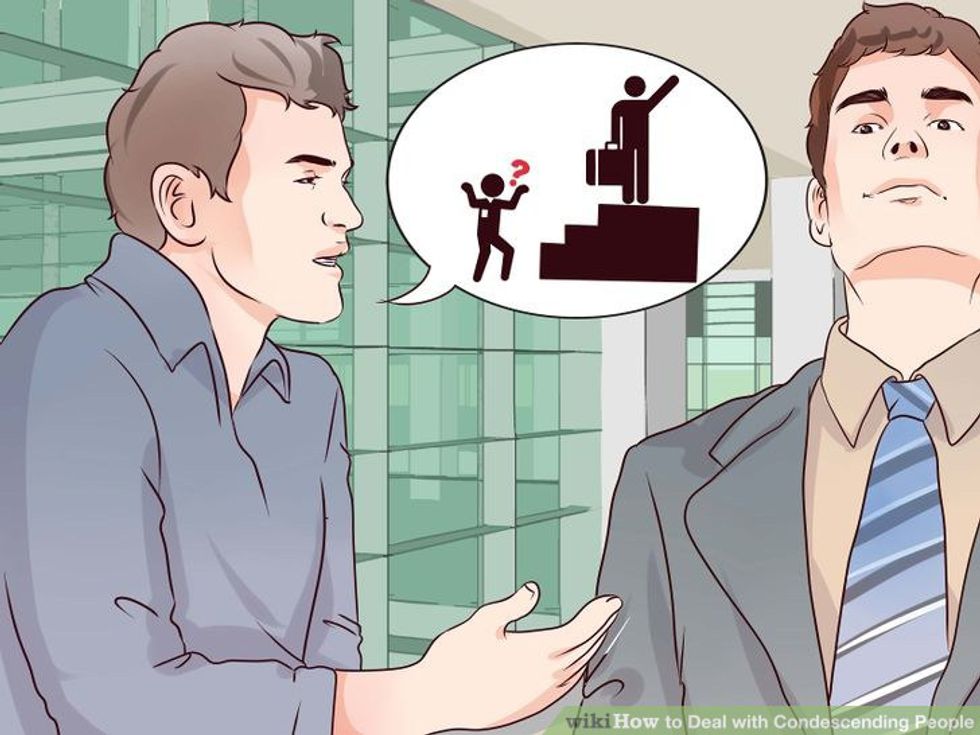Within the past decade, a myriad of research topics and behavioral therapies have surfaced that are making great strides in the realm of helping those with Autism Spectrum Disorders (ASD) lead a satisfying life. However, therapies only go so far. There are still things that are intrinsic to these disorders that people still don’t always understand. While it may not be true for everyone, these are some that I and others with Asperger’s or more severe forms of autism I’ve talked with want "neurotypicals" (that’s just a fancy word for people without an ASD) to know.
10. We’re not being babies; it legitimately hurts.
I cannot tell you how many times I’ve ridden with someone in the car and their favorite song came on. Of course, they turn it up as loud as it can go. While this may not be too much for you, it can be for us. What’s just pleasantly loud to you can be an eardrum-shattering decibel to some. Maybe you greet your best guy friend with a couple punches. That’s fine. Just know that the lightest touch could be excruciating painful; even just the lay of clothes on our skin can be torture sometimes, so you can imagine what actually hitting us does.
On a different sensory note, we’re not being picky eaters, we just process tastes of foods differently. We don’t like mingling tastes. I see mac and cheese and think it should taste like how I know mac and cheese should taste. When you mix in broccoli, bacon or something else, then I don’t know how it should taste and it doesn’t sit well with me. Not to mention the fact that it has to have so much flavor that it’s practically punching my taste buds before it even registers. I don’t just enjoy arranging my plate to look like "It Happened One Night."
9. We’re not boring.
I went to lunch with a friend who's rather severely autistic the other day for the first time to a restaurant he goes to after work. We’ll call him Dan. We got to the restaurant and sat down and our server approached. The first thing out of this boy’s mouth towards Dan was “I can’t believe anyone is having lunch with you. You’re so annoying. All you ever do is try to talk to me about comics.” Not only was this incredibly rude and hurtful, but it also showed this teenager’s ignorance. Yes, we have very specific interests. Yes, we can talk all day about them because we love them so much. That doesn’t mean that it’s all we’ll talk about. We don’t realize that we’re rambling sometimes. All it takes is a question about something else. Steer the conversation towards another subject or even just be blunt; tell us we’re rambling and suggest we talk about another topic. There’s no need to be rude.
8. We’re not being selfish, we just think that others are having as much fun as we are.
Mind-blindness (or, more specifically, alexithymia), it’s something that a lot of us deal with consistently. We don't really understand how other people's minds work - hence, we don't always think that they may be feeling differently. For example, just last night, my roommate came into my room to talk. I continued to play video games until it finally dawned on me that I wasn’t really talking or even paying much attention to her and I realized that she might be bored.
We don’t do it to be mean or selfish; we just don’t realize that the other person may not be feeling the same way we are. We may be having oodles of fun perusing the hobby shop downtown and we automatically think that just because we’re having fun means the other person is having fun as well. All you have to do is give us a small push like, “Hey, I’m getting kind of hungry. Want to go get something to eat?”
7. We’re not stupid. Please don't act like we are.
Whether someone has Asperger's or their home is a little farther on the spectrum, we're not stupid. Don't talk to us as though we're children, please. We're more than capable of handling a full conversation and it's insulting to be talked down to. I'm not saying use deliberately complicated terminology that only someone who devotes their life to a subject might use, but just talk to us like you would anyone else. We might take a few seconds longer to answer you, but that doesn't always mean that we didn't understand you. For me at least, sometimes, it's just the fact that I need to organize what I wanted to say in my mind so it comes out right. We don't always have the easiest time expressing ourselves. What we want to say might be there in our minds, but when we go to say it, it's just somehow gone.
6. We do like you, we just don’t know how to approach romance.
Most people with an ASD are very logical. We think in concrete terms, use logical reason and decide whether or not to do something based on statistical probabilities on whether or not our endeavor will crash and burn. That said, some of us might not be too good at romance. Things are either black or white, not a lot of the grey area that exists in courtship. We’re not usually that good at the give-and-take and subtleties that come with flirtation. Some don’t see the point of flirting because it doesn’t render any immediate verifiable results; it can just go on and on for years and nothing ever becomes of it. That seems a little pointless.
It’s easier, sometimes, to just come straight out and say it: "I like you. Do you reciprocate?" Some will find this a little heavy-handed, but sometimes it’s the only way we know how to get our point across. If the feelings aren’t mutual, don’t get offended that we barged right up and confessed, just tell us. If you feel the same way, then we’ve just achieved what a lot of people stretch out over years. Seems like a good strategy, don’t you think? Maybe this isn’t as bad as I originally thought…
5. We do enjoy socializing, but some of us just don’t enjoy as much of it.
A lot of us with ASD’s tend to be introverts as well. We already don’t require a whole lot of social time and being a little awkward in social situations makes us need even less of that time. It doesn’t mean we don’t want friends, and it doesn’t mean we don’t like to spend time with you; it certainly doesn’t mean that we don’t enjoy it when we do spend time hanging out.
Most people with ASD’s don’t see the point of small talk, which is a massive part of socialization. You don’t get to have a deep conversation in small talk. You don’t get to talk about something you like, and it doesn’t add up to anything other than a few small words in the elevator to Dave the co-worker. It seems pointless, but that doesn’t mean we don’t like you. Now, when we have the chance to hang out with our friends, some of us will jump at the chance and have oodles of fun, but want to leave after four or five hours. Don’t be offended! We thoroughly enjoyed your company. It’s just eventually we get overstimulated interpreting all the body language and voice changes that neurotypicals automatically understand. It’s like listening to a movie in English and having to interpret it into another language at the same time: exhausting!
4. We really are sick that often.
You try to make an attempt to spend some friend time with us: we’re sick, let’s try next week. By that time, you try again: we’re sick again. No, it isn’t just an excuse. We get sick often. OK, so it may not be that bad for everyone, but it is extremely common for people on the spectrum to have weak immune systems. If one person is sick, then it’s pretty much a sure bet that without a few prior safeguards, we’re probably going to get sick as well. Always have the Dayquil and the Emergen-C handy!
3. We’re not being rude, we just think you should know.
You asked us if you looked fat in the dress. We told you the color was wrong, the fit made you look squat and the cut made you look short. Rude, right? Well, no, we didn’t mean for it to be. A lot of us take things literally. We don’t like, and sometimes don’t understand, the little white lie. We think if you ask a question, you should get an answer - plain and simple. Don’t even get me started on hypothetical questions. “It’s not meant to be answered, Jaid!” “Then why did you ask it?!” *shakes fist angrily*
2. If you want to say something, say it.
“Maybe you should find a dress that’s….more your style.” “You really like to talk, huh?” “You want to come over and…see what happens?” And of course the dreaded, “Netflix and chill?” We don’t always get sarcasm and we don’t read between the lines too well. Whether what you want to say is “It doesn’t look good” or if it’s something a little more, ahem, personal in nature, just come out and say it. Transparency is an Aspie’s biggest strength and weakness all in one. It’s a fantastic personality trait because it allows you to speak honestly and openly, but it also leads to not being able to tell when someone is trying to send a silent message.
1. Don’t give up on us.
Don’t give up. I beg you. It might seem that it’s more hassle than it’s worth being our friend. It might seem like we never take into account anyone else. We might seem rude and uncaring sometimes, but I promise you we’re not doing it on purpose. We’re not hopeless. We’re not weirdos that want to sit alone all day every day (most of the time). We have knowledge worth sharing, conversations worth having and late nights playing video games worth enjoying. It’s just that we need a reminder every once in awhile. A reminder that we’re not alone, that we do have friends and people who care about us, that we are normal, that we’re just as good as anyone else. We might get distracted by all the shiny things along the way, but that’s not an excuse to just leave us there. Eventually, we do get lonely and we will get sad.
Take the time to understand us. Love our quirks. Laugh with us at our obliviousness. Accept the frank answers. Love us for who we are and what we can do to enrich your life while you enrich ours and we’ll all be better people at the end of the line.
































